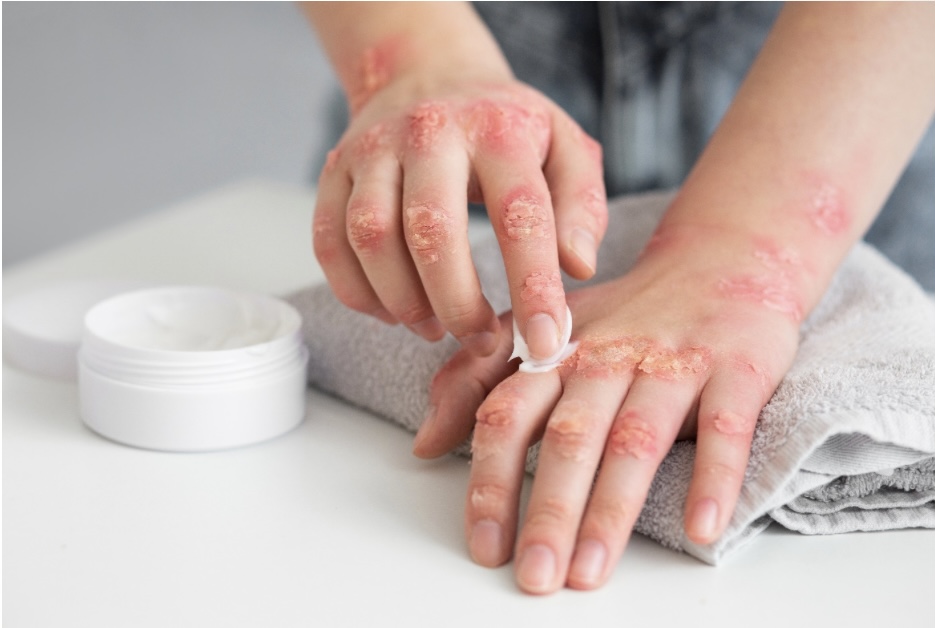Eczema is a chronic skin condition that can affect anyone. It leads to rash-like symptoms with intense itching. If not treated early, it can lead to infection or further complications. That is why treatment is compulsory. But the wrong product can make symptoms worse.
So, how to know which product you should stay away from? One of the most important ways is knowing which ingredients to avoid in your skincare products.
Plus, what ingredients to choose? Here we have guided you with choosing the right products and avoiding ingredients that can be harmful to your condition.
Why Ingredients Matter for Eczema
There is not a single product that works for all people. Every person has a different skin tone that reacts differently to the same ingredients.
But there are some that have proven to treat the symptoms. On the contrary, some ingredients can be harmful. Individuals with sensitive skin witness improvement in their condition if the product contains a gentle yet effective formula.
Ingredients to Avoid If You Have Eczema
These ingredients may itself could be good or neutral, but when you are dealing with eczema, these ingredients could cause allergic reactions or worsen flare-ups.
That is why it is best to choose a product that is free from these harmful elements.
Fragrances
Do scented products feel good? Yes, but they can be dangerous for skin conditions, especially for people who are sensitive or allergic to scents. Even “natural” fragrances from essential oils can cause problems.
Some products label themselves fragrance-free, but it does not mean they do not contain fragrance. They contain scents to mask fragrance. So avoid products with masking fragrance too.
Urea
While urea is sometimes used to increase hydration, in higher concentrations it can sting, burn, or irritate sensitive skin. There are proper references from health giants on this, as it can irritate the skin and exacerbate the symptoms. People with eczema often find that urea-based products worsen their condition rather than helping.
Parabens
Parabens are preservatives found in many lotions and creams. Although they extend shelf life, they can disrupt the skin barrier and cause irritation for those with eczema. Switching to paraben-free skincare reduces unnecessary risks.
Dyes and Artificial Colors
Added purely for cosmetic appeal, dyes serve no benefit to your skin. They can trigger allergic reactions, worsen redness, and make eczema more uncomfortable.
Look for products labeled “dye-free.” When dealing with this condition, you must prefer safety over beauty.
Retinoids
They are commonly used in anti-aging skincare for their cell turnover benefits. However, they are highly irritating and drying, two things eczema-prone skin cannot tolerate. If you want anti-aging care, look for gentler alternatives.
Formaldehyde-Releasing Preservatives
Formaldehyde and ingredients that release it over time (like quaternium-15) are strong allergens. They are sometimes used in skincare products, but should be strictly avoided by anyone with eczema.
Ethanol
Ethanol is a drying alcohol that strips away natural oils. For people with eczema, this can lead to cracking, flaking, and worsened inflammation.
Harsh Alcohols
Not all alcohols are harmful. Fatty alcohols such as cetyl or stearyl alcohol can actually be moisturizing. But harsh alcohols like isopropyl alcohol or SD alcohol are damaging and irritating for sensitive skin.
Ingredients to Include Instead
Now that we’ve looked at what to avoid, let’s focus on the good. Certain ingredients can calm irritation, repair the skin barrier, and keep moisture locked in. Look for these on your product labels:
What Is the Best Shampoo for Eczema?
Eczema isn’t limited to your arms, legs, or body. It can also affect the scalp. This condition, often confused with dandruff, causes itching, scaling, and redness on the head.
Choosing the right eczema shampoo and body wash is critical to avoid worsening the irritation.
The best shampoos for eczema are:
Using a gentle eczema shampoo along with preventive measures can give you a well-rounded approach to managing eczema.
This eczema shampoo is created by a pediatrician, so it is safe for individuals with sensitive skin and children. Use it as mentioned on the label, and you will see significant improvements within the first few uses.
Wrapping up
It could be frustrating if eczema is not improving or recurring. But you must get the treatment to solve the issue.
If treatment is not working, you must look at the ingredients label and check if the harmful ingredients mentioned in this article are present on the label.
If yes, throw away those products and choose the right eczema shampoo we mentioned in this article. It is free from harsh chemicals and contains extracts from nature.
The formula is gentle yet effective for the skin. Besides this, one must follow precautionary measures to double the protection and effectiveness.
